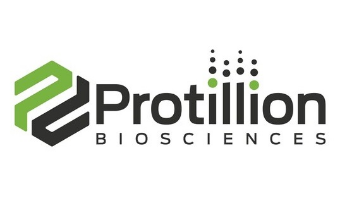Company Spotlight – Protillion Biosciences

Company Spotlight – Protillion Biosciences
A Molecular Sorting Hat
Protillion is building an instrument that rapidly analyzes large protein libraries to identify therapeutic molecules.
Developing protein therapies is a numbers game. For every one molecule that safely and effectively treats a specific condition, billions of alternatives need to be sifted through to find it. This painstakingly slow and iterative process can take months or even years.
Protillion Biosciences wants to change that time frame to days or weeks. The San Diego area company is developing machine learning-enhanced drug discovery technologies that produce better therapeutic proteins, faster.
“In recent years, we’ve sent how effective protein therapies, particularly antibodies, can be,” said Malek Faham, M.D., Ph.D., Chief Scientist, at Illumina Ventures. “Protillion has developed technology that can sort through huge protein libraries to quickly determine which ones have the greatest potential.”
Born of Frustration
High-throughput DNA sequencing revolutionized the life sciences, but these readouts tell only one part of the biological story. To create effective therapies, labs must fully characterize proteins as well. Unfortunately, protein analysis has lagged far behind genomic sequencing, a source of great frustration for Protillion co-founder Curtis Layton, Ph.D.
“I was at Stanford in the 2010s when biology was being transformed by next-generation sequencing,” said Layton. “But the whole time I was thinking: Why is it only DNA that is so ultra-high throughput? Proteins are arguably the more important class of molecules to intervene in human health. Where are the high-throughput protein technologies?”
Layton and several Stanford colleagues decided to figure it out. They annexed a basement room, cadged spare parts from old genome sequencers and designed custom electronics and software. It took years, but they eventually created a working instrument.
“We built a platform that was analyzing proteins at throughputs nobody had ever accomplished before,” said Layton. “It was very exciting.”
Harnessing Transcription
Layton’s experience with in vitro transcription and translation – which converts DNA to RNA to proteins in a test tube – set the stage for Protillion’s high-throughput protein analysis machinery.
The technology starts with a DNA library that encodes multiple protein variants. The technology then translates DNA to RNA and RNA to proteins on a chip, with all these molecules linked together. The instrument can generate as many as 106 analyzable features from the original DNA, including duplicate variants to provide more statistical heft.
“We then use a sequencer-like instrument to read the DNA sequences and protein binding characteristics,” said Layton. “Quite often, we can detect binding to multiple targets, and it’s super-fast: we go from a DNA library to quantified hits and candidates in two days.”
Because Protillion’s technology produces massive datasets, the company had to develop computational techniques to produce actionable information. They took a somewhat novel approach to AI.
“Many companies are looking at AI for drug discovery, but their focus is on AI first, data second,” said Layton. “We take the opposite approach. We are a data generation company, and we are building this massive infrastructure to deliver protein sequence/function data. Then we layer on the AI to really understand protein sequences and binding traits.”
Generating Proof of Concept
Protillion’s technology got a big test during the COVID pandemic. Biopharma companies were developing neutralizing monoclonal antibodies to protect against SARS-CoV-2. Unfortunately, once the virus mutated, these antibodies would lose effectiveness. There was a repeating cycle of emergency authorization by the FDA being revoked, a new antibody being shown to be effective against the new strain, and the cycle continued. Layton and colleagues wondered if they could identify a pan-mutant antibody that would be effective against many different past and future variants of the virus
“We thought, let's take a library of COVID binders and measure the binding of every single molecule in that library,” said Layton. “Let's measure the binding to three very different strains: SARS-CoV-1 from 2003, SARS -CoV-2 wild type out of Wuhan, and Omicron. We were excited to see that out of a large library, hundreds of thousands of molecules, we found three rare antibodies that bound to all three strains—and we did it in a matter of weeks.”
Unlocking Specificity
This kind of power to rapidly assess protein binding in large libraries could have a major impact on drug discovery. For example, identifying pan-mutant antibodies could also be an important step towards better cancer therapies.
There may also be opportunities to develop antibodies that target specific protein receptor isoforms – leaving others untouched – which could reduce off-target effects. This technology might also help identify molecules that only activate in low pH regions, like tumor microenvironments. In the big picture, Layton sees many opportunities to therapeutically modulate the immune system.
“The immune system has become a central theme,” he said, “and the ability to precisely modulate it could have an enormous impact on cancer, autoimmune conditions and many other areas.”
Protillion has developed several early-stage devices to test hypotheses and generate data. The company is now working on a next-generation machine, which it will use to identify therapeutic molecules and develop its own therapies and partner with other biopharma companies.
“Our biggest advantage is our ability to solve challenging protein engineering problems,” said Layton. “Right now, we are looking for the right partnering opportunities to showcase these capabilities. Longer term, we see critical challenges in drug discovery that our technology uniquely positions us to solve, and that will be the basis for our own pipeline.”